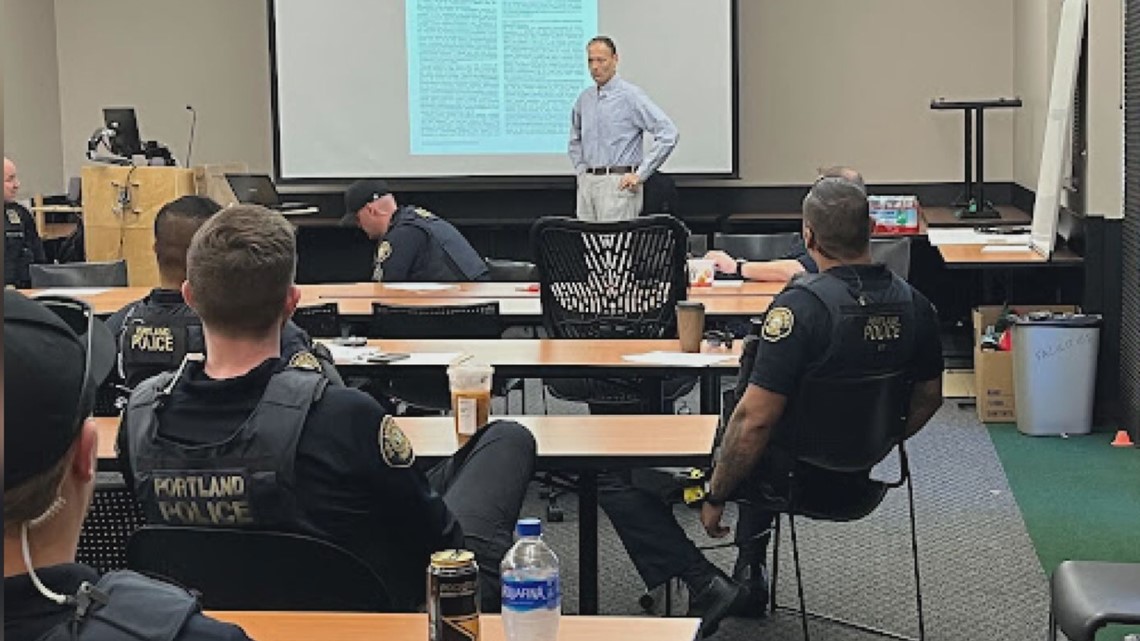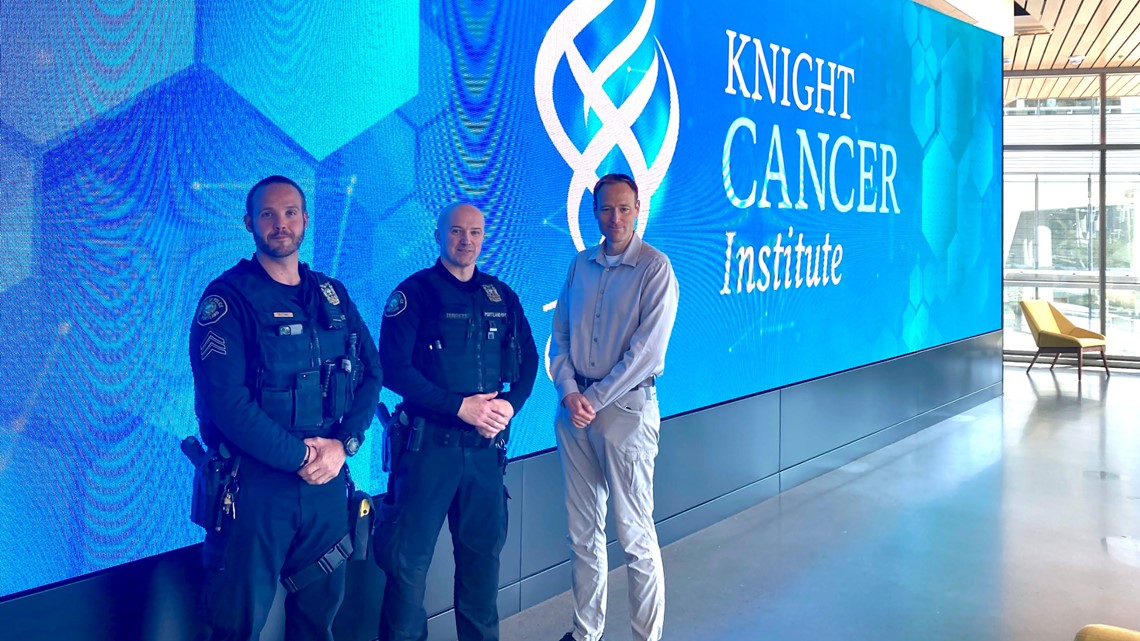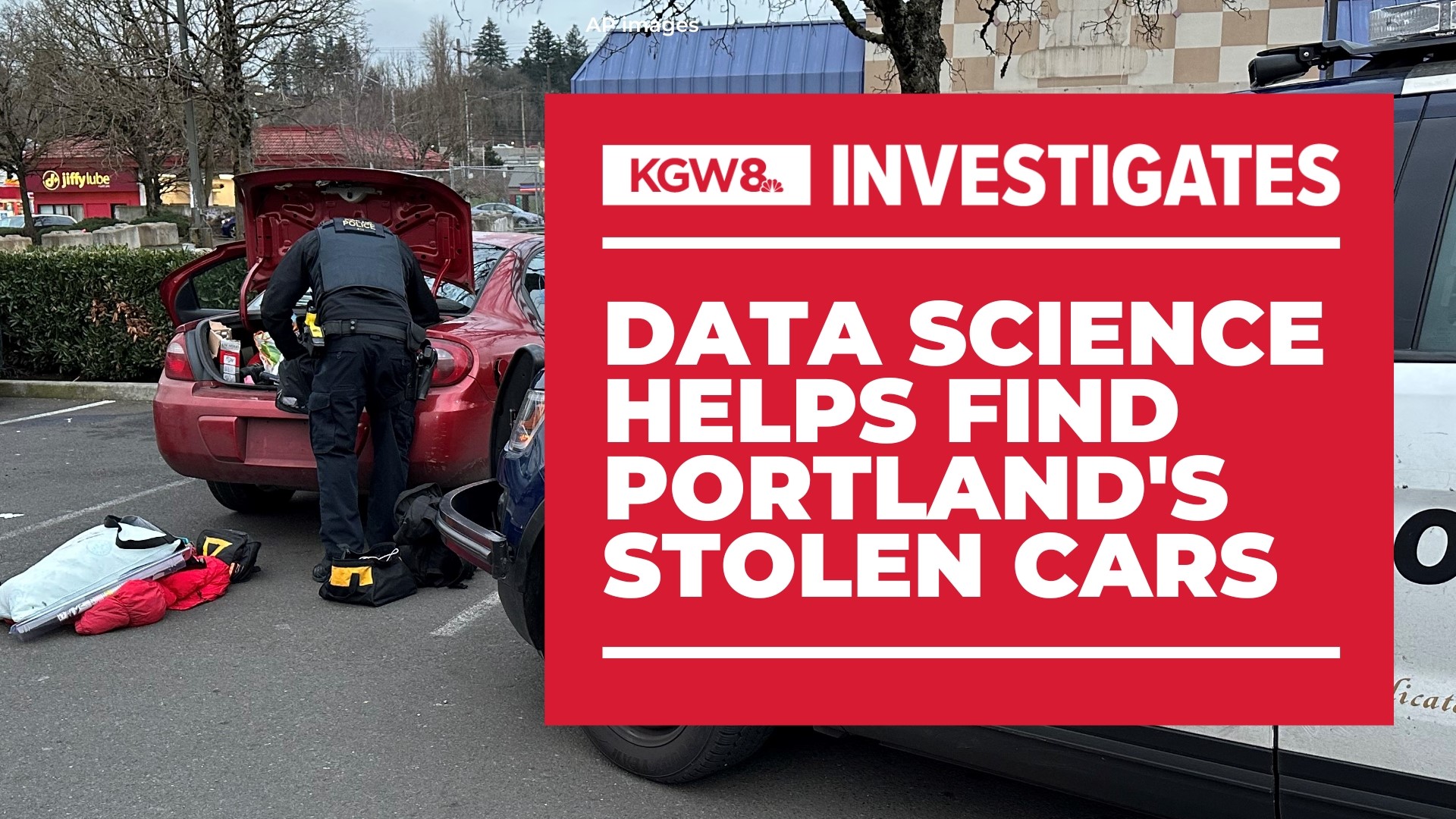PORTLAND, Ore. — It’s 4:44 on a Friday afternoon. Portland Police officers from East Precinct are conducting a stolen vehicle operation. Their mission is to track down stolen cars and make arrests.
"We've already got one. And they recovered a gun," said East Precinct Commander Erica Hurley during the early stages of the 10-hour operation.
This coordinated effort involving nearly 30 officers relies on training, planning and experience — along with a new tactic. Portland Police officers are using data science to help track down stolen cars, in the same way sports teams use analytics or companies optimize performance.
"What we're learning here is how to use our data in a process that helps us do better work with less resources," said Hurley.
To make better use of the raw data collected by officers, the Portland Police Bureau turned to an unlikely partner — researchers at Oregon Health and Science University's Knight Cancer Institute.
"We will never learn or grow if we don’t try new things," Hurley said.
Portland's car theft problem
Portland has seen a rising number of stolen vehicles over the past several years. 2022 set a new record with 10,894 reports of stolen vehicles in the city, according to police data.
On average, that means a vehicle is stolen in Portland every 48 minutes. Not only does a stolen car create a hardship for the owner, but it also impacts the community.
"They lead to other crimes," said Portland Police Officer Jose Jimenez.
Stolen vehicles are sometimes used to commit crimes like murders, shootings and armed robberies, Jimenez said. Additionally, suspects driving stolen vehicles often try to elude police, because they know PPB policy prohibits officers from chasing stolen vehicles.
Police ramp up efforts to recover cars
East Precinct officers created the stolen vehicle operation in November 2021 to try to tackle the growing problem. Their initial strategy was to flood an area with police officers, along with aerial support from a police airplane, to make traffic stops, arrests and recover stolen vehicles.
Each operation covers one work shift and focuses on a specific area of East Portland. TEast Precinct gets the most 911 calls of any precinct and has the highest priority call load.
To some degree, it worked. During the initial five stolen vehicle operations, from November 2021 to March 2022, officers at East Precinct recovered 14 stolen vehicles. Police also made several arrests, but most were not related to stolen vehicles.
The officers wanted to find a better way, so they turned to the data. The idea was to find out how veteran officers identified stolen vehicles, then translate that into a formula that could help others working these special missions.
"We very seldom ever asked that 15-year guy to break it down," explained Hurley. "What do you see in that car? What is it doing? How does it look? Why is it a stolen car?"
Digging into the data
In March 2022, officers at East Precinct started tracking attributes they observed on stolen vehicles, then they filled out a detailed, one-page questionnaire. Nearly 100 factors were collected in total, then compiled in a database and analyzed.
The factors included physical characteristics of the vehicle and vehicle driving behavior. Police said they don't track data about the driver’s racial profile as part of this effort.
Officers at East Precinct call these elements "enrichment factors" — essentially hallmarks of a stolen vehicle. Examples can include a missing license plate, a broken window, no lights or abnormal lane changes. The more enrichment factors present, according to the theory, the more likely a car is stolen.
During a recent stolen vehicle operation, Commander Hurley pointed to several enrichment factors police identified on a vehicle before pulling it over. Officers later confirmed the car was stolen.
"There’s no plates on the vehicle," said Hurley, looking over a stolen Chrysler Neon in Southeast Portland. "There’s a trip permit that may not come back to this vehicle. Their driving was erratic. Then when officer tried to initiate a traffic stop on it, it ran. It eluded."
Bringing in OHSU
To better understand the data that officers had collected, Portland Police turned to researchers at the OHSU Knight Cancer Institute.
"Police are collecting and using data to make their process more precise and more efficient. That’s exactly the same thing we do here in cancer research," explained Dr. Jeff Tyner of OHSU Knight Cancer Institute.


Tyner specializes in using large data sets as a professor of cell, developmental and cancer biology. He's also family friends with the officer at East Precinct who helped develop the idea of using data to identify stolen cars.
Researchers at OHSU Knight Cancer Institute met with officers at East Precinct. Tyner even rode along with police during a stolen vehicle operation. The scientist offered advice on best practices for data collection and analyzing the information.
"We were giving them feedback and telling them if we thought it made sense, which it really did," said Tyner.


The researchers made several suggestions, including recommending officers adopt a data dictionary, or specific definition to every factor being collected.
"This way, you can be sure that everyone who is collecting data, organizing and analyzing the data is all on the same page," Tyner explained.
Data-focused approach pays off
After almost a year in practice, the data science appears to be helping officers work more effectively. They're making fewer overall stops during stolen vehicle operations, but getting better results.
Prior to considering enrichment factors, police officers at East Precinct recovered one stolen vehicle for every 31 stops. Now, they’re recovering one stolen vehicle for every five stops.
In the past 15 operations, officers at East Precinct have recovered 106 stolen cars, made 169 arrests and recovered 24 guns.
"There’s the old saying: work smarter, not harder," explained Sgt. Steve Wilbon. "You take the experience from the senior officers and now put it on paper and provide that to the newer or younger officers."
Officers at East Precinct hope to expand the program within the Portland Police Bureau. They’ve already started testing it during retail theft missions, and hope to share their data science strategies with agencies beyond Portland.
"This innovation is exciting and fun," said Hurley. "We need to do more of it because the results and benefits of it are too big to measure."

